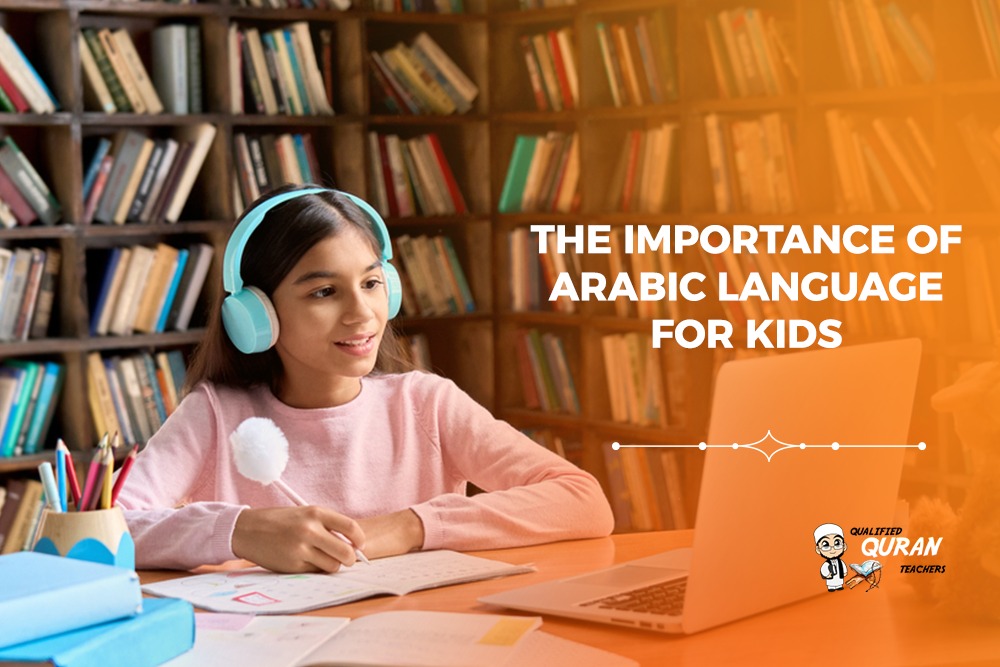The Importance of Arabic Language for Kids
SEO Meta-description: Discover the crucial role of the Arabic language for kids, highlighting its benefits for cognitive development, cultural appreciation, and global connectivity. Understand why early exposure to Arabic can shape a brighter future.
In today’s interconnected world, the importance of learning a second language has never been more evident. For children, acquiring the Arabic language opens up a wealth of opportunities, not just in terms of communication, but also by fostering a deeper understanding of cultural nuances and enhancing cognitive abilities. This article explores the various reasons why learning Arabic is particularly beneficial for children, emphasizing its significance in cognitive development, cultural connection, and global engagement.

Cognitive Benefits of Learning Arabic
- Enhanced Brain Development: Studies have shown that learning a second language, especially one as complex as Arabic, can significantly improve cognitive skills. It enhances memory, problem-solving abilities, and critical thinking skills. The script, structure, and vocabulary of Arabic challenge learners in unique ways, contributing to greater mental flexibility and creativity.
- Improved Academic Performance: Children who learn Arabic often display improved performance in other academic areas. The mental discipline required to grasp the language’s right-to-left writing system and its phonetic intricacies can translate into better focus and analytical skills, benefiting subjects like mathematics, science, and literature.
Cultural Appreciation and Identity
- Connecting with Heritage: For children of Arabic-speaking heritage, learning the language is a powerful way to connect with their cultural roots. It provides them with a sense of identity and belonging, enabling them to communicate with relatives, understand cultural references, and participate fully in family traditions.
- Understanding and Respect for Diversity: Learning Arabic opens children’s eyes to the rich tapestry of cultures in the Arabic-speaking world. It fosters an appreciation for diversity, teaching them respect and empathy for people from different backgrounds. This cultural sensitivity is a crucial skill in our globalized society.
Global Opportunities and Connectivity
- Career Advantages: In the global job market, proficiency in Arabic can offer a competitive edge. The demand for Arabic speakers in fields such as diplomacy, international business, and translation is high. Early exposure to the language can pave the way for a variety of career opportunities in the future.
- Access to a Rich Literary and Scientific Heritage: Arabic is the language of a vast body of literature, science, and philosophy. Learning Arabic enables children to access this heritage directly, enriching their knowledge and understanding of world history and contributions to various fields of knowledge by the Arabic-speaking world.
Practical Tips for Introducing Arabic to Children
- Start Early: Children absorb languages more easily at a young age. Introduce Arabic through songs, simple conversations, and interactive games to spark their interest.
- Use Technology Wisely: Leverage apps, online courses, and educational games designed for children to make learning Arabic fun and engaging.
- Incorporate Cultural Elements: Enhance language learning with cultural activities like cooking Arabic dishes, celebrating festivals, and reading Arabic stories, to bring the language to life.
- Encourage Regular Practice: Consistency is key in language learning. Encourage daily practice and use of Arabic in practical contexts to reinforce their skills.
- Seek Supportive Communities: Joining language learning groups or communities can provide motivation and additional resources for both parents and children.
Conclusion: A Gateway to a Richer Future
Introducing children to the Arabic language is more than just adding another skill to their repertoire; it’s opening a door to a richer, more interconnected future. The cognitive, cultural, and global benefits of learning Arabic equip children with the tools they need to navigate an increasingly multicultural world with confidence and curiosity. As parents and educators, fostering a child’s interest in Arabic is an investment in their intellectual and personal growth, preparing them for the challenges and opportunities of the 21st century.
Expanding further on the importance of the Arabic language for kids, it’s essential to delve into the long-term impacts and specific strategies that can enhance the learning experience, ensuring that children not only learn the language but also grow to appreciate and use it effectively in various contexts.
Long-Term Impacts of Arabic Language Proficiency
- Global Understanding and Peace-Building: Proficiency in Arabic can play a pivotal role in fostering global understanding and peace-building. By breaking down language barriers, children can grow into adults who contribute to dialogues that bridge cultural divides, promoting peace and mutual respect on an international scale.
- Access to Emerging Markets: The Arabic-speaking world encompasses a dynamic and diverse group of countries, many of which are emerging markets with growing economies. Proficiency in Arabic not only opens up career opportunities but also provides insights into the business practices and consumer behaviours of these markets, valuable for entrepreneurs and business professionals.
- Enhanced Neuroplasticity: The cognitive benefits of learning Arabic extend to enhanced neuroplasticity. This refers to the brain’s ability to form and reorganize synaptic connections, especially in response to learning or experience. Early exposure to the complex structures of Arabic can enhance this adaptability, benefiting learners throughout their lives.
Strategies for Effective Arabic Language Acquisition
- Cultural Immersion: While structured lessons are important, cultural immersion can significantly enhance language acquisition. This can include travel to Arabic-speaking countries, attending cultural festivals, or regular interaction with native speakers. Such experiences provide contextual learning opportunities that deepen understanding and fluency.
- Reading and Literature: Encouraging children to read Arabic literature, ranging from classic texts to contemporary children’s stories, can significantly improve their language skills. Reading helps in vocabulary expansion, understanding grammatical structures, and gaining cultural insights through storytelling.
- Writing Practice: Writing in Arabic is not just about learning the alphabet and forming words; it’s a critical skill for mastering the language. Encourage children to keep a journal, write letters, or create stories in Arabic. This practice can improve their writing skills and enhance their ability to express thoughts coherently in Arabic.
- Language Partners and Tutors: Partnering with native speakers or hiring tutors who are fluent in Arabic can provide personalized learning experiences. Language partners can offer conversational practice, while tutors can provide structured lessons tailored to the child’s learning pace and interests.
- Leveraging Multimedia Resources: The use of multimedia resources, such as Arabic language films, television shows, and music, can make learning more engaging. These resources provide authentic language exposure, helping children to hear the natural flow of the language and to improve their listening and comprehension skills.
Encouraging Persistence and Celebrating Progress
Learning Arabic, with its rich lexicon and distinct phonetic and grammatical structure, can be challenging. It’s important to set realistic expectations and celebrate milestones, no matter how small. Encouragement and positive reinforcement can motivate children to persist in their learning journey. Recognizing progress, whether it’s mastering a new set of vocabulary words, completing a book in Arabic, or successfully engaging in a conversation, reinforces their confidence and commitment to learning.
Conclusion: A Journey of Discovery and Growth
Introducing kids to the Arabic language is not just about teaching them to communicate in another language; it’s about opening their minds to new ways of thinking, understanding, and interacting with the world. The benefits of learning Arabic extend far beyond linguistic proficiency, offering cognitive, cultural, and global advantages that can last a lifetime. By adopting effective strategies and fostering an environment of encouragement and support, parents and educators can guide children on a rewarding journey of discovery and growth through the Arabic language.
Register Now

